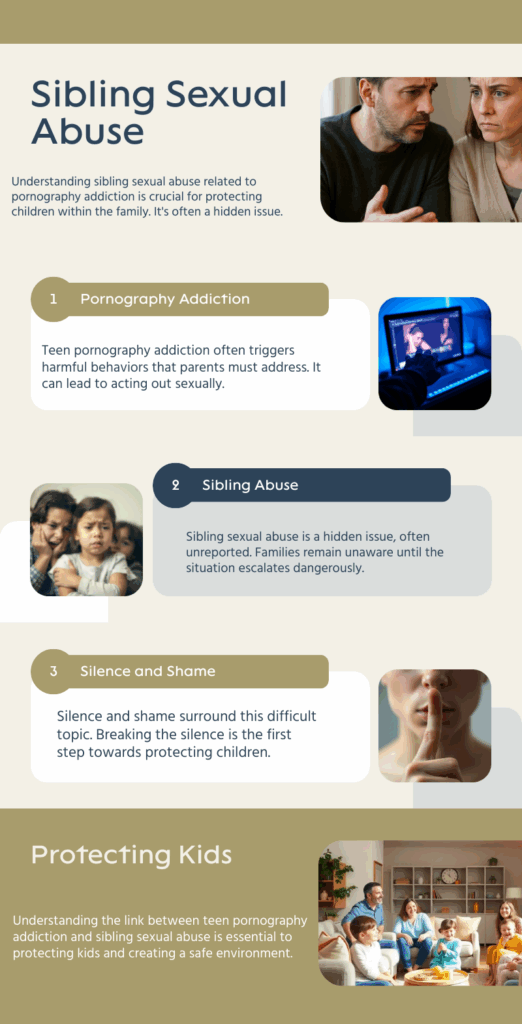As a parent, discovering that your teenage son’s pornography use has escalated into harmful sexual behavior with a sibling is one of the most heartbreaking and overwhelming moments you can face. You’re not alone, and—most importantly—this situation is treatable when addressed with compassion, professional help, and the right therapeutic environment. This guide is written for parents who are actively researching solutions, including residential or wilderness therapy programs such as Star Guides, which specializes in teen boys struggling with compulsive sexual behavior, pornography addiction, and related boundary violations.
Why Sibling Sexual Abuse Often Stays Hidden Longer Than Other Forms of Abuse
Sibling sexual abuse is one of the most under-reported forms of intra-familial abuse. Unlike parent–child abuse, it frequently happens without adult supervision and is shrouded in shame, confusion, and fear on all sides. Children and teens involved—both the one who was harmed and the one who acted out—often stay silent because they:
- Fear they will “break up” the family
- Feel deep shame or believe they are “bad.”
- Worry about getting in trouble or losing privileges
- Don’t fully understand that what happened was wrong or traumatic
- Love their sibling and feel conflicted about “telling.”
Because of this silence, many parents only discover the behavior after it has been occurring for months or even years.
Warning Signs Parents Should Watch For
Early intervention can prevent further harm. Be alert to sudden or unexplained changes such as:
- Withdrawal from family activities or close friends
- Heightened anxiety, irritability, or mood swings
- Noticeable fear or avoidance of a specific sibling
- Age-inappropriate sexual knowledge, language, or behavior
- Regression (bed-wetting, nightmares, school refusal)
- Physical complaints (genital pain, bruising, or STIs in severe cases)
Trust your instincts. If something feels “off,” it’s worth investigating gently and professionally.
The Link Between Pornography Addiction and Sibling Sexual Acting-Out
Today’s teens can access hardcore pornography at younger ages than ever before. For a subset of boys who become compulsively dependent on porn, the material can:
- Normalize coercive or aggressive sexual behavior
- Erase a healthy understanding of consent and boundaries
- Desensitize them to the real-world impact of their actions
- Create a compulsive urge to reenact what they’ve seen
When emotional maturity, impulse control, and real-life education haven’t caught up with sexual exposure, some teens experiment on the people closest and most accessible to them—their siblings.
Important: These teens are not “monsters” or “predators” in the adult sense. Most are struggling adolescents whose brains have been hijacked by addiction and who desperately need specialized intervention.
How Parents Can Respond: A Healing-Centered Approach
- Stay as Calm as Possible
Your child is watching to see if the family will survive this revelation. A calm, non-shaming response (“I’m upset about what happened, but I love you and we are going to get help”) keeps the door open for honesty and treatment. - Prioritize Immediate Safety
In almost all cases where sibling sexual contact has occurred, the teen who acted out must have a safety plan that includes no unsupervised contact with younger siblings. For many families, this means a temporary or longer-term out-of-home therapeutic placement. - Seek Specialists—Fast
General therapists are rarely equipped to handle the combination of compulsive pornography use, sexual boundary violations, and family trauma. Look for clinicians and programs that explicitly treat:- Adolescent sexual compulsivity/porn addiction
- Trauma-informed care for both victim and offender
- Family systems work
Star Guides Wilderness Therapy is one of the few programs in the United States designed specifically for teenage boys (ages 13–17) with these exact issues. Their clinically intensive wilderness model combines individual therapy, group process, family workshops, neurofeedback, and experiential interventions in a screen-free environment—often exactly what is needed to interrupt the addiction cycle and rebuild healthy identity.
- Support Both Children (Victim and Offender)
The sibling who was harmed needs trauma-focused therapy and reassurance of safety.
The teen who acted out needs accountability, addiction treatment, and compassionate care that addresses root causes (trauma, ADHD, anxiety, early exposure, etc.). - Educate the Entire Family About Boundaries, Consent, and Healthy Sexuality
Open, ongoing, age-appropriate conversations replace secrecy with clarity. - Tighten Technology Controls and Keep Talking
Use robust filtering/monitoring software, but don’t rely on it alone. The goal is to move from secrecy to openness so your teen brings their struggles to you instead of acting them out.
A Real Family’s Journey (Shared with permission, details changed for privacy)
Sarah noticed her 14-year-old son, Ethan, becoming increasingly isolated and irritable. When her 10-year-old daughter began having nightmares and avoiding Ethan, Sarah’s alarm grew. A courageous conversation with her daughter revealed months of sexual contact initiated by Ethan after heavy pornography use. Instead of exploding or minimizing, Sarah secured immediate therapy for her daughter and began researching intensive options for Ethan. Within weeks, Ethan enrolled at Star Guides Wilderness program. Over the next 60–90 days, he received daily individual therapy, group work with peers facing the same issues, neurofeedback for impulse control, and weekly family sessions via video. Eighteen months later, Ethan came home with a solid relapse-prevention plan, genuine empathy, and restored family relationships. His sister continued her own therapy and reports feeling safe. The family describes the wilderness experience as “the hard reset we all needed.”
There Is Hope—and Effective Help Exists
If you are reading this because your family is in crisis, please hear this: families do heal from this. Teen boys do recover and grow into healthy, respectful men when they receive the right intervention at the right time. You are not a failure as a parent. You are a parent who is courageously seeking answers. If your son needs a level of care that cannot safely be provided at home, programs like Star Guides have helped hundreds of families restore safety, accountability, and connection. You don’t have to figure this out alone. Reach out to a qualified professional today—your children’s future healing begins with the step you take right now.

